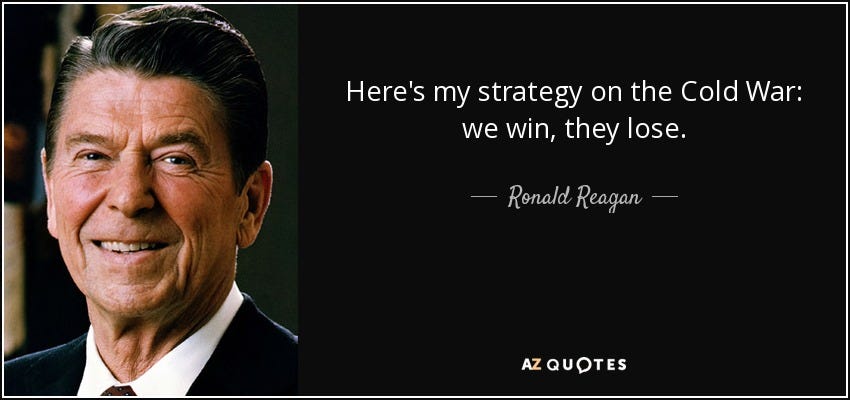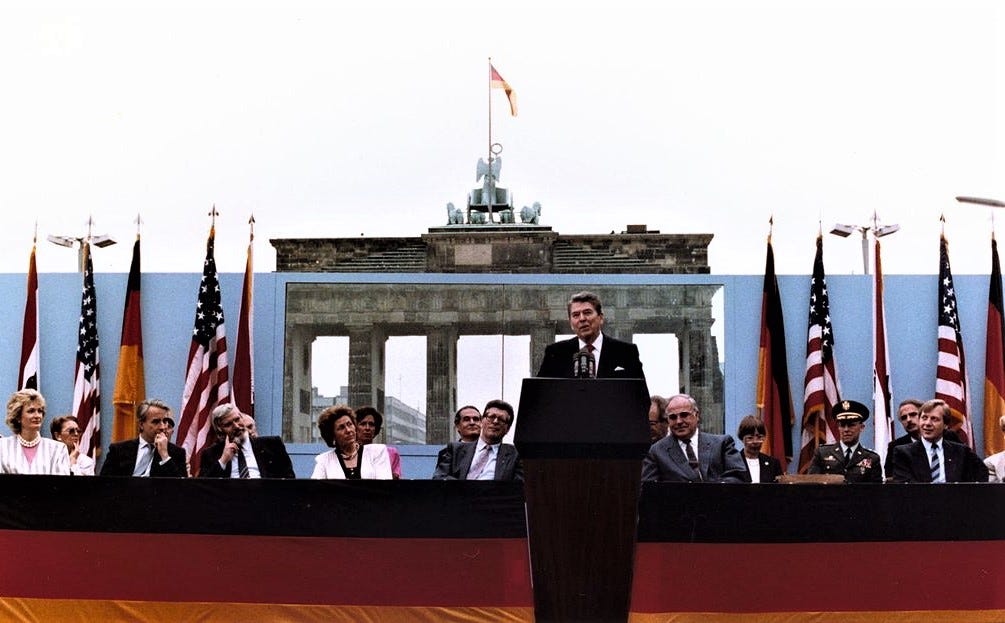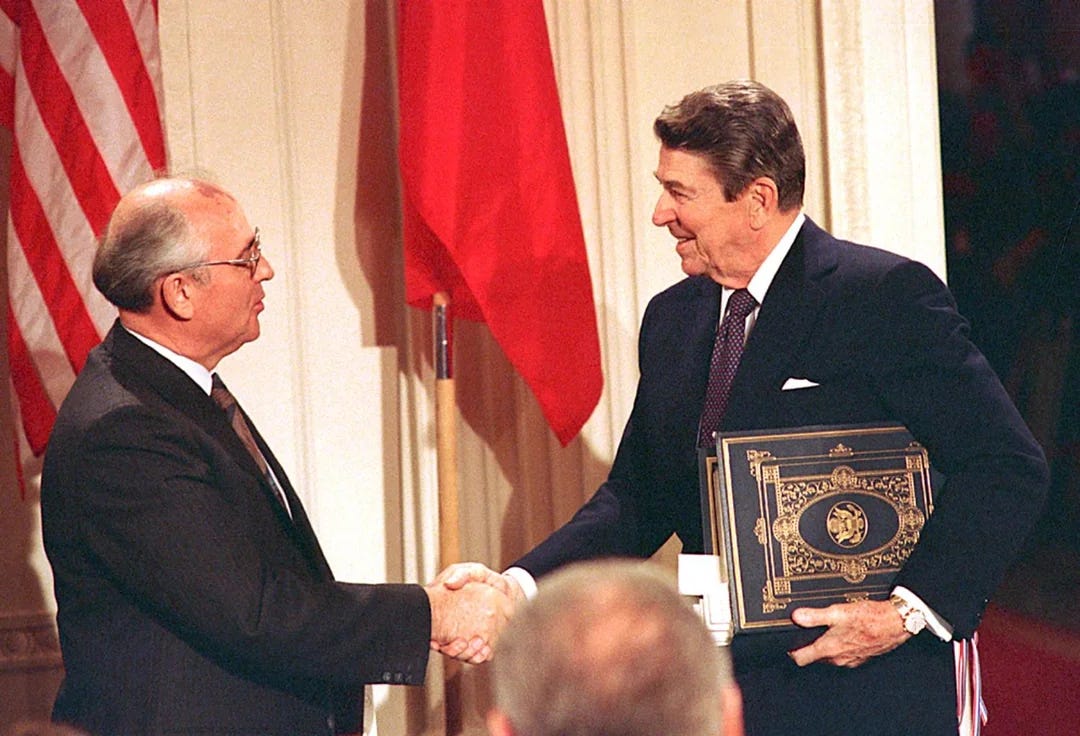We Win, They Lose: Lessons from Reagan’s Victory in the Cold War for Today
December 29, 2024 by James E. Fanell & Bradley A. Thayer
Since its inception, the People’s Republic of China (PRC) has been at war to destroy the United States of America. While the existing national security establishment has refused to acknowledge this fact, a critical lesson that the incoming Trump national security team must face in this current Cold War fight with the PRC is comprehending how the country won the last Cold War against the Soviet Union. While the causes of the U.S. victory were many—a free people with a superior ideology, a dynamic capitalistic economic system, greater military effectiveness, and better allies—underpinning all was the belief that the U.S. should win the Cold War—that the U.S. should defeat the Soviet Union in the Cold War struggle. While many titans in U.S. national security sought that end, the most important person was Ronald Reagan. Victory was, and should remain today, the strategic objective. “We win, they lose” was Reagan’s strategic objective. As victory was Reagan’s strategic objective, so must it be Trump’s as well.
In word and action and with his great allies, including Pope John Paul II, Reagan worked to topple the Soviet Union. Soviet leaders understood this and were terrified of an American leader who was employing U.S. and allied power to challenge their power.
Reagan had a deep understanding of the evils of Communism. His judgment was Rhadamanthine: Communism is an evil ideology. He labored to defeat it when he was president of the Screen Actors Guild, as governor of California, and when he was president of the United States. Reagan explicitly targeted the Soviet Union, identifying it for what it was—evil, and thus it had to be destroyed by every means available to the U.S., including economic, diplomatic, military, and political warfare. Thank goodness Reagan succeeded in contrast to the advocates of détente. In every sense that mattered, advocates of détente sought to sustain Communist rule in the USSR rather than destroy it. The Cold War victory freed the peoples of Central and Eastern Europe and the Russian people and culminated in the elimination of the existential threat of Soviet communism and their aspirations for the defeat of America and global domination.
As with the Communist Party of the Soviet Union, there can be no peace with the Chinese Communist Party (CCP). The CCP seeks the defeat of the U.S. as the Soviets did and the establishment of a new global order where Beijing sets the rules through venues like their Global Development Initiative, Global Security Initiative, and Global Civilizational Initiative. Accordingly, the incoming Trump administration must come to grips with the fact that the CCP is the enemy, as Beijing views America. This Cold War, as was the last, is existential; either the CCP or the U.S. wins—there is no middle ground, and there can be no long-term negotiation or new promises of “engagement with a purpose,” which is another excuse to continue the status quo.
As we have argued repeatedly, including in these pages, the dispositive question of the 21st century is whether the CCP wins or the U.S. This is a Cold War fought in every realm except the kinetic—for now. We must defeat the CCP as they seek to defeat us and have since coming to power in 1949. The ambition to kill the U.S. has always been present. What was lacking was the power. Regrettably, due to repeatedly failed engagement policies with the PRC, the CCP now has the power to severely hurt the U.S., something that is demonstrated daily.
The problem is not solely the tyrannical rule of Paramount Leader Xi Jinping. The foundational problem is Communist ideology and the political system the CCP has wedded to the economic and military might of the PRC. Fundamentally, the U.S. has no quarrel with the Chinese people, and the Chinese people have none with the U.S.; rather, it is the ideology of Communism that has and continues to compel the CCP to target the U.S. for destruction. The PRC now has the power to do so, precisely because the great strategist Deng Xiaoping waged a genius political warfare strategy of threat deflation against the U.S., which America’s national security elites used to justify a policy of engagement with the PRC. The Engagement School gave the PRC unfettered access to the Western economic ecosystem, thus permitting its great and rapid expansion.
As with Reagan, there is the need to identify the CCP as the true root of evil. Reagan stated in 1983 that the Soviet Communist Party was “the center of evil in the modern world.” Thus, as Reagan did, the Trump administration must also seek out and work with the Chinese people and people of goodwill around the world to create optimistic conditions that will allow the Chinese people to make their own decisions concerning their government.
There is no question that this is a multifaceted and challenging problem, but as Clausewitz advised leaders about war, a nation must focus on the center of gravity—which is the CCP. While Xi is a formidable and dangerous ruler with Olympian ambitions, his death or removal from power would not fundamentally change the PRC’s strategy. The cause of the current Cold War is not one man. Xi could be replaced by any member of the Politburo’s Standing Committee, and their strategic objective would remain the same—to defeat the U.S. The ideological motivation of the CCP is the cause of the intense security competition with the U.S. The CCP seeks to supplant the U.S. as the dominant state in international politics by destroying the U.S.’s ability to prevent that objective. This is a zero-sum fight to the finish. The incoming Trump team must act as Reagan did—that the CCP must be defeated and the U.S. must win.
The military requirements are considerable and must revolve around what is militarily effective, not on what the U.S. spends, but on what our real military capabilities are. Unfortunately, the U.S. is lacking in the conventional, nuclear, force structure, logistics, and defense infrastructure; and lastly, we must have the willpower to 1) identify the CCP as the existential threat and 2) enact the right policies to defeat it.
The economic policy required by a Reaganesque “We Win, They Lose” is to end all engagement. No more trade, investment, mil-to-mil, etc. Cut the CCP and all entities off from the U.S. market, Western markets, all investments, and other Western fillips to the CCP’s power. Suffocate the CCP from foreign direct investment, and their economy will teeter and soon topple, and this will create those conditions that will cause the people of China to throw off the yoke of communism.
These measures are necessary because the first rule of strategy is: Do not help your enemy. Sadly, for too long the U.S. has aided our enemy year after year. It is now time to put strategists in charge, rather than economists or financiers. There must be no aid of any kind to the enemy. There is no “right” amount of engagement with the CCP, even if it is packaged as “engagement with a purpose.”
The CCP’s political warfare strategy against the U.S. is directed at sustaining engagement. Since the policy of engagement is part of the CCP’s overall plan to destroy the U.S., then it makes imminent sense for the incoming Trump administration to end immediately the practice of unconstrained and unaccountable engagement that dominates every department of the U.S. federal government. Instead, the new Trump national security team would do well to adopt a strategy of victory, implementing a unified approach across government and society to counter the CCP through political warfare, in conjunction with the Chinese people and supporters around the world. Historically, the U.S. defeats its enemies. It does not engage with them. The policy of engagement is at variance with U.S. history and U.S. strategic thought. The fact that it has been so successful for the CCP underscores a triumph for their political warfare against the U.S.
The CCP is at war with the U.S. in all respects save the kinetic, so far. Time is running out, and the U.S., under the new leadership of the Trump team, can defeat the CCP through political warfare, backed by robust military and economic power. No doubt, there will be aleatory events as there were in the last Cold War. The struggle might be a long one. But the objective is clear. As Reagan identified, we win, the enemy loses, which was responsible for victory in the Cold War against the Soviet Union. While others argue that an American administration must not seek to defeat the PRC, the fact remains the CCP is openly seeking America’s destruction. As such, victory over the CCP must be the strategic objective of the Trump administration. The U.S. wins, the CCP loses. There is no other option.
***
James E. Fanell and Bradley A. Thayer are authors of Embracing Communist China: America’s Greatest Strategic Failure. The views expressed are their own.







The cover letter is to long for a comment. The Emperor’s Clothes
Cost Twenty Dollars
https://pages.boblivingstonletter.com/emperors-clothes/the-emperors-clothes-lp08.php?SC=B11564108
Bob Livingston
Today is the Federal Reserve's 111th birthday. It's likely to slip by with little fanfare, though it should be a day that lives in infamy. It's more destructive than Pearl Harbor. In fact, it made Pearl Harbor — and all wars in the last century — possible.
On Dec. 23rd, 1913, Congress passed the Federal Reserve Act. The act itself was conceived three years earlier during a secret meeting of moneyed elites and their U.S. senators/proxies.
The Federal Reserve was conceived in a secret meeting at a wealthy retreat on a barrier island called Jekyll Island, Ga., in 1910. The principals involved were: Senator Nelson Aldrich, the father-in-law of John D. Rockefeller Jr., representing Rockefeller interests and the Standard Oil crowd; Paul Warburg, a German banker representing MM Warburg of Hamburg, European banking interests (including the Rothschilds) and Kuhn Loeb in the U.S.; Henry P. Davison, partner in J.P. Morgan and chairman of Bankers Trust Company (a consortium of New York's biggest banks); Benjamin Strong, vice president of Bankers Trust; Frank Vanderlip, chairman of National City Bank (Vanderlip was also a Rockefeller agent — related by marriage — and was a director of Rockefeller's railroad and lumber concerns); and Charles D. Norton, president of the First National Bank. Assistant U.S. Secretary of the Treasury Abraham Piatt Andrew is also reported to have attended.
They established a private bank that controlled U.S. monetary policy. Although named the Federal Reserve, the bank is not a part of the Federal government. It is a private for-profit entity owned by the member banks.
Let me repeat that: The Federal Reserve is not owned by the citizens of the United States. It is owned by the banksters.
The Fed holds no reserves but lends "money" to other banks — both in the United States and abroad — and the Federal government. The loans must be paid back with interest. But the money the Fed lends is not real money. It's simply a kited check.
The Fed has the authority to arbitrarily set interest rates and lend money to whomever it wishes, and it has no real accountability to Congress or the President.
The Fed has a monopoly on the issue of all bank notes. National and State banks can issue only deposits, and the deposits are redeemable only in Federal Reserve Notes. All banks are forced to become members of the Federal Reserve System.
The Fed is the lender of last resort, and that power allows it to inflate to bail out banks, as we saw extensively in 2008-2009, and of course during the COVID lockdowns.
Like most all nefarious legislation, the Federal Reserve Act was passed in a rush. Congress was eager to head home for the holidays; so two days before Christmas, there was no stomach in Washington for a lengthy debate on the bill's merits. In fact, 28 of the 96 Senators had already left Washington.
Named the Owen Bill after Senator Robert Latham Owen of Oklahoma — a major stockholder of the First National Bank of Muskogee — the Republicans did not even see the conference report, which is normally read to the floor, and some Senators said they did not know the contents of the bill. The act passed the Senate 43-25.
The act got more support in the House, where over 70 of the 435 members had gone home. Most Congressmen didn't even know what the bill was about. No amendments were allowed, and members were only allowed to vote for or against. The bill was named for Representative Carter Glass of Virginia (a director of the United Loan and Trust and the Virginia Trust Company). The vote was 298 for, 60 against. President Woodrow Wilson then quickly signed it.
And guess who was appointed to head the New York Federal Reserve? None other than Benjamin Strong, J.P. Morgan's minion, former vice president of Bankers Trust and one of the original conspirators who met on Jekyll Island to draft the bill that would create the Federal Reserve. Likewise, the Washington Federal Reserve was headed by two Morgan men, two Rockefeller minions, and two men of undetermined affiliations: a prominent Alabama banker and an economist with vague family connections to Morgan family interests.
China and communism must be squashed. HIVE MINDS